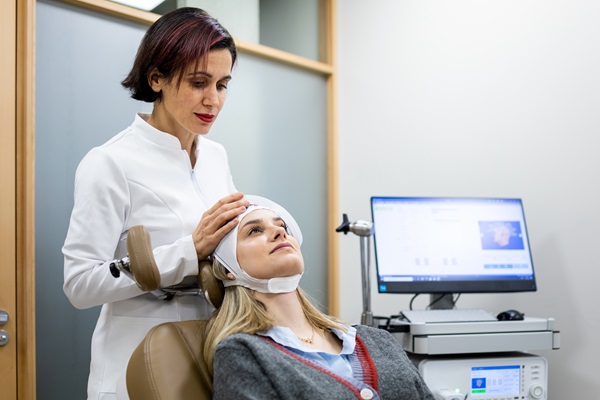PsychiatristNew York, NY
A psychiatrist takes care of your mental health the same way a physician takes care of your general health. Life today is a lot more hectic than it was a few hundred years ago, as most of us find ourselves working longer hours, which often leads to our mental and general health being overlooked.
Psychological issues such as depression can take away the joy from many activities and things you once enjoyed. Psychiatric treatment can significantly improve your quality of living, allowing you to live a rich, fulfilling life.
How a psychiatrist improves your mental health
A psychiatrist is a doctor who specializes in diagnosing and treating mental health issues like depression, anxiety, ADHD, and substance abuse disorders. They are trained to assess and address the physical and mental aspects of mental health issues. Their qualifications allow psychiatrists to write prescriptions for their clients. Other mental health professionals like psychologists are not qualified to write prescriptions for mental health disorders.
Psychological problems like bipolar disorder, ADHD, anxiety, and depression can typically be treated effectively with medication. Medication is often combined with psychotherapy for optimal results. If that fails, alternative treatments like Transcranial Magnetic Stimulation (TMS) can be used to improve the patient’s brain chemistry.
Other ways psychiatrists can help people with mental health disorders include:
- Diagnosing mental health issues and developing treatment and recovery plans
- Providing urgent care for sudden mental episodes
- Managing long-term health conditions
- Working with patients, their family members, and their partners
- Providing advice and second opinions to other healthcare professionals
- Referring patients to other healthcare professionals
- Admitting patients to hospitals if required
Some of the reasons why a person might need psychiatric care include:
- Mental disorders that are challenging to diagnose
- Suicidal feelings or plans
- Mental health issues that require medication that can only be prescribed by a psychiatrist
- Disorders that do not respond to standard treatments provided by a general physician
- Difficulty adjusting to stress or significant life changes like the loss of a loved one
- Anxiety
- Violent thoughts
- Depressed mood that does not go away
- Self-harming behavior
- Constant negative thoughts
- Obsessive thoughts
- Hallucinations
- Disjointed thoughts
- Substance abuse
- Addictive behaviors like gambling
- Inability to concentrate or focus
- Emotional or violent outbursts
- Memory problems
- Insomnia
Treating mental health disorders
Some of the treatments a psychiatrist might recommend for patients with mental health issues include:
1. Psychotherapy
Psychotherapy involves helping patients to cope with mental health disorders by identifying triggers that add to the problem and teaching them better ways to deal with these triggers. It might involve one-on-one sessions with a psychiatrist, and it can also be family- or group-based. Psychotherapy can be effective as a standalone treatment for disorders like depression, but it is often combined with medication for optimal results.
Psychotherapy can be broken up into a handful of categories:
- Behavioral therapy: This approach involves teaching patients new behaviors so that they can change unhealthy ones. It can involve the therapist using a reward/punishment-based system to promote specific behavioral changes or exposing patients to phobias in a controlled environment to desensitize them
- Humanistic therapy: This therapy style is patient-centered since the patient is in charge of what goes on in their mind. It focuses on teaching patients how to make rational choices and develop to their full potential
- Cognitive therapy: This approach focuses on the patient’s thoughts and teaches them ways to refrain from negative ones. It works off the belief that negative thoughts lead to negative behaviors. The goal of these therapy sessions is to teach the patient how to recognize unhealthy thought patterns and inaccurate or irrational beliefs
- Group therapy: This typically involves the psychiatrist working with groups of up to 15 patients. Group members serve as each other’s support system, helping to promote positive changes. Group therapy is often used to treat issues like chemical dependency, chronic pain, grief, social anxiety, and obesity
- Holistic or integral therapy: This type of psychotherapy involves combining some of the approaches listed above based on the patient’s specific needs. Cognitive-behavioral therapy is an example of holistic therapy. It combines behavioral and cognitive therapy to address negative emotions and behaviors simultaneously
2. Medications
Psychotropic drugs can help with the symptoms of mental health disorders and improve the brain chemistry of people battling these disorders. These drugs typically work by improving chemical signals in the brain. Patients prescribed psychotropic drugs are usually evaluated periodically during their treatments to evaluate the effectiveness of their cocktail and to detect side effects.
Some of the different classes of drugs used to treat mental health issues include:
- Antidepressants: These are used to address issues like eating disorders, borderline personality disorder, obsessive-compulsive disorder, anxiety, PTSD, panic disorder, and depression
- Antipsychotic medications: These are used to address the symptoms of disorders like schizophrenia and bipolar disorder
- Anxiolytics and sedatives: These are usually prescribed for insomnia and anxiety
- Hypnotics: This class of drugs helps to induce and preserve sleep
- Mood stabilizers: These are primarily used to address bipolar disorder
- Stimulants: These are typically prescribed for patients with ADHD
3. Transcranial magnetic stimulation
Transcranial magnetic stimulation is an alternative approach for treating mental health issues like depression. The procedure is approved by the Food and Drug Administration (FDA), and it is typically recommended for patients with treatment-resistant depression.
The procedure involves repeatedly delivering magnetic waves into the patient’s brain. It is a non-invasive procedure, and there is no need for sedatives and anesthetics. The pulses delivered into the brain help increase activity in the prefrontal cortex, reducing the symptoms of mental disorders like depression. The magnetic waves are delivered by placing an electromagnetic coil on the patient’s scalp. The coil is turned on and off repeatedly, sending waves into the patient’s brain.
Side effects of TMS treatments are typically mild, and they usually go away after a few sessions. The most commonly reported side effects include headaches, lightheadedness, twitching and tingling of facial muscles, and scalp discomfort. Psychiatrists can reduce these side effects by decreasing the intensity of a patient’s treatments or prescribing or recommending medication. TMS treatments usually involve getting up to five 40-minute sessions a week for up to six weeks.
Psychiatric care can get your life back on track
Our psychiatrist has years of experience helping people with mental health disorders to live healthy, happy lives. Call or stop by our New York clinic to set up an appointment.
Request an appointment here: https://www.hopetmsofny.com or call Hope TMS and Neuropsychiatric Center at (646) 578-8152 for an appointment in our New York office.
Contact Us
Hope TMS and Neuropsychiatric Center is located at 57 W 57th St #808 New York, NY 10019.





